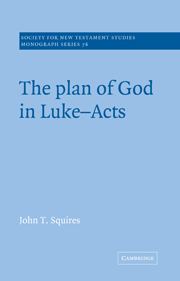Book contents
- Frontmatter
- Contents
- Acknowledgements
- List of abbreviations
- 1 The plan of God in Luke–Acts
- 2 The Programmatic role of providence in hellenistic historiography
- 3 Providence: God at work in human history
- 4 Portents: signs of divine action in human history
- 5 Epiphanies: inspired indications of the plan of God
- 6 Prophecy: foretelling and fulfilling the plan of God
- 7 Fate: the necessity of the plan of God
- 8 Conclusions
- A select bibliography
- Index of Greek words
- Index of subjects and authors
- Index of biblical references
3 - Providence: God at work in human history
Published online by Cambridge University Press: 22 September 2009
- Frontmatter
- Contents
- Acknowledgements
- List of abbreviations
- 1 The plan of God in Luke–Acts
- 2 The Programmatic role of providence in hellenistic historiography
- 3 Providence: God at work in human history
- 4 Portents: signs of divine action in human history
- 5 Epiphanies: inspired indications of the plan of God
- 6 Prophecy: foretelling and fulfilling the plan of God
- 7 Fate: the necessity of the plan of God
- 8 Conclusions
- A select bibliography
- Index of Greek words
- Index of subjects and authors
- Index of biblical references
Summary
Throughout Luke's life of Jesus and the history of the early church, God is depicted as being constantly at work. Luke presents the actions of God in a comprehensive manner, extending throughout the whole span of history, in accord with the consistent divine design and intention. God's actions, as Luke reports them, begin at creation and continue through the history of Israel, the life of Jesus, his resurrection, exaltation and appointment as judge and the growth of the early church. The concentration of divine activity throughout the two volumes is such that we might reasonably speak of God as the subject of the whole story.
This thematic strand in Luke–Acts undoubtedly owes much to the way in which the Hebrews presented their national history in their own scriptures. Although the influence of the Septuagint on Luke is not to be discounted, in this chapter we will place Luke–Acts within the context of hellenistic historiography, thus enabling us to see how hellenistic readers would have understood this emphasis. As we indicate how Luke's work shares affinities with such literature through his presentation of the divine activity in history, we shall also notice the function which this theme serves in Luke–Acts.
Providence in hellenistic historiography
At various points throughout their histories, both Dionysius and Diodorus advance the proposition that providence is guiding events.
- Type
- Chapter
- Information
- The Plan of God in Luke-Acts , pp. 37 - 77Publisher: Cambridge University PressPrint publication year: 1993



